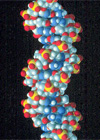Religion of Science

"Science without religion is lame. Religion without science is blind." - Albert Einstein
The question often comes up about how we can keep kids interested in science? After all, as taught in school it is often very boring, dry, stuff. Particularly to young minds that want to be doing and thinking about other things. Albert may have had the solution.
The companion question to that one is: How do we keep adults interested in science? Particularly since their lives are often a complex mess and science isn’t a big priority for them. They don’t see how it fits in with who they are, or how it is going to help, unless they’re MacGyver.
Science is thought of as cold logic, void of emotion.
Many educators seem to think it has to be made fun so kids relate to it as play in some way. Some teachers do a good job of that while others fail miserably.
Still others try to awaken or use a child’s wonder at the world and their place in it. Some kids get it and some don’t. There is no one way to reach all people, so a variety of methods is probably not a bad idea. But unfortunately through no fault of theirs, each teacher has their own particular method, rather than there being a way to tailor a method to suit every individual child.
Because of a set curriculum and the fact that getting the right teacher for any individual is no better than a crap shoot, science almost inevitably becomes a chore for most kids. When are they going to need a science education after they leave school unless they are planning on going in to the field?
Religion, on the other hand, gets a lot of people’s attention. Most people in the world have religious beliefs of some sort; even if not the ones handed to them by parents or their culture. Why is that?
Almost every person at some point in their lives asks themselves the big questions like: Who and what am I? What purpose does life serve? How did we get here?
And with those questions in mind many people turn to religion, because answering those questions is and probably always has been the purview of religion.
Science can tell us many things, but it will never explain the really big questions, right? Well I’m not so sure that’s true.
We seem to forget the obvious: science is the study of us, and the universe, and even our place in it. All those subjects are related. By knowing science and cultivating a logical mind we are using a method of thought that has a good chance at finding the truth about: “life, the universe, and everything.”
But what happens is that most people don’t understand that the logical mind is not dispassionate. They think logic is cold and unfeeling. That puts them off it as way of thinking. The average person trying to embrace logic makes that mistake and tries to emulate Spock from Star Trek. But is logic served by being completely emotionless? Certainly not.
Simply repressing emotion is not healthy. You have them whether or not you want them. Emotion exists for a reason. It often represent needs. Emotions make us do things. They demand a resolution. The only way to deal with emotions is to understand them, work them out, and thereby resolve them once and for all.
That’s often a difficult thing to do and requires logic. The way you perceive things affects the way you feel about them. Logic is a tool of thought. It does not require that you abandon feeling it only demands you abandon irrational ideas when you notice how irrational they are.
In the mid 1900s many controversial and often disturbing experiments were done in aid of explaining emotion. It was thought that rationality was better served without it. But what they found in the end was that rationality is not complete without emotion.
This is illustrated very well in experiments done on people who through brain injury or through surgery no longer feel much emotion. It turns out, for instance, that emotion helps us with pattern recognition and risk evaluation.
It would be irrational to try to do away with your emotion because it comes from the subconscious. This is a complex subject I have written about elsewhere, so I won’t expound on them here.
Religion purports to tell us why thing are as they are. But the answer always boils down to the idea that a god wants it that way. Again, as I have explained in detail elsewhere: That doesn’t tell us much, if anything, even if you think it’s true.
Science tells us how things probably work, based on facts and good evidence. From it we have discovered so very much. And what we have discovered is awe inspiring. From physics to genetics the world and, indeed the universe, reveals its secrets bit by bit. And boy it’s complex, amazing, and often counter intuitive.
To discover the universe is a religious experience of the first order. It gives us the answer to some of those questions we have about our own place in it all. And along with science philosophy it can and does replace religion for many.
What is a religious experience but the feeling of connection to something much larger than self? And indeed science points out blatantly how very connected we are to all things. That which many religions knew intuitively for thousands of years has been confirmed by science in a hundred ways.
Religions often tell us that if we follow them they will show us the true meaning of our lives. Yet they only have philosophical positions to base their answers on. The person who bases their search for self on science has a logical, factual, base for their philosophical perspectives.
It won’t come as surprise to anyone that science has already been taken as the basis for philosophy. Materialism/Physicalism is one such philosophical position. But it may surprise some people that this obviously atheist philosophy has morphed into a religion.
There are several atheistic religions. Some forms of Buddhism, Confucianism, and Taoism are religions that do not worship gods. But Pantheism, known as Naturalist or Scientific Pantheism, is the first openly atheistic religion based on science.
I say openly because Pythagoras is reported to have based a religion on math and geometry. But since it was a secret religion, presumably for his pupils and mathematicians only, nothing is really known about it except that it was reported to have existed. He is noted as saying something to the effect that his mathematics was his religion.
One might well ask why an atheist would want a religion. Fact is that many do not. There are many atheists who have no interest in religion or science. Existentialists often see the universe and existence as ultimately futile and meaningless.
But atheism means only one thing and tells us only one thing about a person. It tells us that person does not believe there are conscious gods of any number or sort interested in the affairs of human beings, or in the business of creating and maintaining them.
It tells you only what a person does not believe. It does not tell you what a person does feel or believe. Many people share lack of belief in gods, but that may be the only perspective any given two atheists share. Atheism isn’t a belief; it’s a lack of belief. So for some of us who love the wonder of the universe and a sense of connection to all things, a world view (and you don’t have to think of it as a religion) based in science is perfect.
I think it is wonderful that more and more people are turning to Pantheism to fulfill their desire for community with likeminded people.
In the sense that the totality or universe or nature is what produced us that creative process fulfills the role of a traditional god nicely; except of course that while it nurtures us by providing what we need to survive by virtue of having created the conditions for our existence, it doesn’t monitor our activities. But even so, cause and effect are task masters that demand morality just as stringently as the Jewish/Christian god does. Being moral is not just what is best for all of us, it is logical.
And that is what should be being taught in schools. Kids should understand that science relates to everything, because all subjects are related. At the moment all subjects are taught in isolation as if the universe can be broken up into stand alone pieces. It can’t.
I’m not saying kids should be taught science as a religion. I am saying it should be taught as if it is a religion because it is, in effect, the same thing in the context of the questions it asks and the questions it can and will answer. Science, the science oriented mind, the logical mind, and science philosophy are destined to replace religion.
Now many will object and say that science and religion differ in that religion is spiritual while science is about the material world. But what is spirituality? It assumes we have a soul and that somehow that soul is separate from the more base material world.
Instead of answering that directly, let me say that science is the evolution of religion. It’s new look at the universe. It questions everything and assumes nothing. I don’t know for a fact that there is no soul, but at the same time I have no evidence that a soul exists as described in the religious context.
Is the soul a question that science will ask? No. Not likely. But because all subjects are intimately related, a philosophical study of the findings of science may well point to the answer. Or, if there is a soul, science should eventually run into it indirectly.
“All religions, arts and sciences are branches of the same tree.” - Albert Einstein
Science is eliminating the speculation religion has to use, and replaces it with either factual answers or a wait and see attitude. Most people want answers right now. Religion exists because of that human desire. But there is nothing more honest than saying you don’t know if you don’t know. Faith is just speculation.
However, spirituality can be seen in the context of how we feel about the mystery of the world and the universe. Searching for who and what we are, finding ourselves, is a spiritual journey by definition.
Unlike other world views like Christianity, a scientific world view like pantheism is not dogmatic, it is dynamic. There are no hypothesis that are set in stone unless they have been proven time and time again. Even then new evidence can change our world view in an instant.
That’s what real education is all about, isn’t it?








